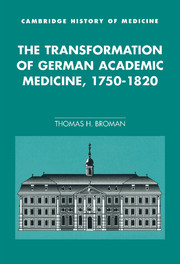Book contents
- Frontmatter
- Contents
- Acknowledgments
- Introduction
- 1 Physicians in eighteenth-century Germany
- 2 Fractures and new alignments
- 3 Physicians and writers: Medical theory and the emergence of the public sphere
- 4 The art of healing
- 5 Breaking the shackles of history: The Brunonian revolution in Germany
- 6 German academic medicine during the reform era
- Conclusion: Disciplines, professions, and the public sphere
- Index
- Cambridge History of Medicine
1 - Physicians in eighteenth-century Germany
Published online by Cambridge University Press: 30 September 2009
- Frontmatter
- Contents
- Acknowledgments
- Introduction
- 1 Physicians in eighteenth-century Germany
- 2 Fractures and new alignments
- 3 Physicians and writers: Medical theory and the emergence of the public sphere
- 4 The art of healing
- 5 Breaking the shackles of history: The Brunonian revolution in Germany
- 6 German academic medicine during the reform era
- Conclusion: Disciplines, professions, and the public sphere
- Index
- Cambridge History of Medicine
Summary
THE IDEAL DOCTOR
During the eighteenth century, it was standard practice for medical professors to present their subjects as a series of lectures based on textbooks written either by themselves or by other scholars. Many professors preferred to write their own text, no doubt in part for the income they hoped to earn from its purchase by students, but they could just as reasonably select someone else's work if it suited their purposes. Thus one student, who enrolled at the Prussian university of Duisburg in 1763, recalled later that during his first semester he heard one of his professors lecture on surgery “from his own manuscript”, and on anatomy “according to Heister's compendium”. More remarkable, perhaps, is what the student reported about the other member of the Duisburg medical faculty. From that professor, he wrote, “from 8–9 o'clock I heard physiology according to Boorhaave's [sic] compendium, from 9–10 o'clock pathology, likewise according to Boorhaave, and from 3–4 in the afternoon therapy, again from Boorhaave”.
Indolence surely had something to do with this complete reliance on Boerhaave, but the professor's contemporaries could scarcely have faulted his choice of authority, for Herman Boerhaave (1668–1738) was a figure of incomparable stature to eighteenth-century physicians. Time and again they invoked his authority in their writings, exalting him to an honored place in the pantheon of medical immortals. By the hundreds they flocked to the University of Leiden to hear him lecture on medicine, botany, and chemistry.
- Type
- Chapter
- Information
- Publisher: Cambridge University PressPrint publication year: 1996

